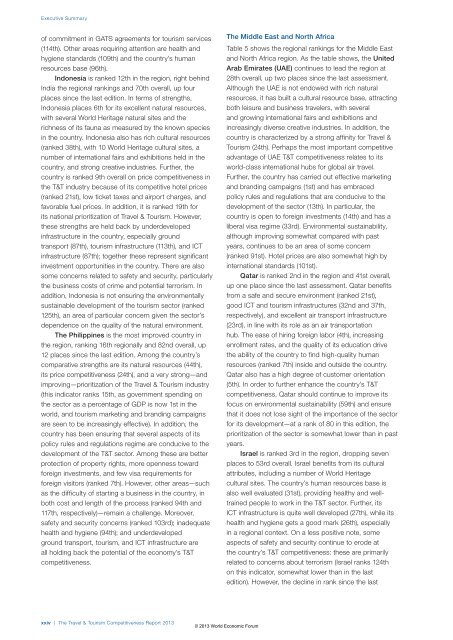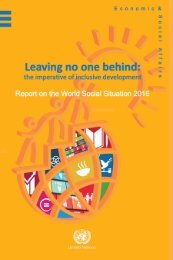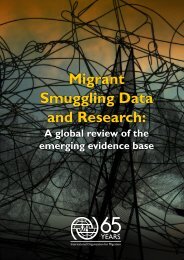The Travel & Tourism Competitiveness Report 2013
The Travel & Tourism Competitiveness Report 2013
The Travel & Tourism Competitiveness Report 2013
Create successful ePaper yourself
Turn your PDF publications into a flip-book with our unique Google optimized e-Paper software.
Executive Summary<br />
of commitment in GATS agreements for tourism services<br />
(114th). Other areas requiring attention are health and<br />
hygiene standards (109th) and the country’s human<br />
resources base (96th).<br />
Indonesia is ranked 12th in the region, right behind<br />
India the regional rankings and 70th overall, up four<br />
places since the last edition. In terms of strengths,<br />
Indonesia places 6th for its excellent natural resources,<br />
with several World Heritage natural sites and the<br />
richness of its fauna as measured by the known species<br />
in the country. Indonesia also has rich cultural resources<br />
(ranked 38th), with 10 World Heritage cultural sites, a<br />
number of international fairs and exhibitions held in the<br />
country, and strong creative industries. Further, the<br />
country is ranked 9th overall on price competitiveness in<br />
the T&T industry because of its competitive hotel prices<br />
(ranked 21st), low ticket taxes and airport charges, and<br />
favorable fuel prices. In addition, it is ranked 19th for<br />
its national prioritization of <strong>Travel</strong> & <strong>Tourism</strong>. However,<br />
these strengths are held back by underdeveloped<br />
infrastructure in the country, especially ground<br />
transport (87th), tourism infrastructure (113th), and ICT<br />
infrastructure (87th); together these represent significant<br />
investment opportunities in the country. <strong>The</strong>re are also<br />
some concerns related to safety and security, particularly<br />
the business costs of crime and potential terrorism. In<br />
addition, Indonesia is not ensuring the environmentally<br />
sustainable development of the tourism sector (ranked<br />
125th), an area of particular concern given the sector’s<br />
dependence on the quality of the natural environment.<br />
<strong>The</strong> Philippines is the most improved country in<br />
the region, ranking 16th regionally and 82nd overall, up<br />
12 places since the last edition. Among the country’s<br />
comparative strengths are its natural resources (44th),<br />
its price competitiveness (24th), and a very strong—and<br />
improving—prioritization of the <strong>Travel</strong> & <strong>Tourism</strong> industry<br />
(this indicator ranks 15th, as government spending on<br />
the sector as a percentage of GDP is now 1st in the<br />
world, and tourism marketing and branding campaigns<br />
are seen to be increasingly effective). In addition, the<br />
country has been ensuring that several aspects of its<br />
policy rules and regulations regime are conducive to the<br />
development of the T&T sector. Among these are better<br />
protection of property rights, more openness toward<br />
foreign investments, and few visa requirements for<br />
foreign visitors (ranked 7th). However, other areas—such<br />
as the difficulty of starting a business in the country, in<br />
both cost and length of the process (ranked 94th and<br />
117th, respectively)—remain a challenge. Moreover,<br />
safety and security concerns (ranked 103rd); inadequate<br />
health and hygiene (94th); and underdeveloped<br />
ground transport, tourism, and ICT infrastructure are<br />
all holding back the potential of the economy’s T&T<br />
competitiveness.<br />
xxiv | <strong>The</strong> <strong>Travel</strong> & <strong>Tourism</strong> <strong>Competitiveness</strong> <strong>Report</strong> <strong>2013</strong><br />
<strong>The</strong> Middle East and North Africa<br />
Table 5 shows the regional rankings for the Middle East<br />
and North Africa region. As the table shows, the United<br />
Arab Emirates (UAE) continues to lead the region at<br />
28th overall, up two places since the last assessment.<br />
Although the UAE is not endowed with rich natural<br />
resources, it has built a cultural resource base, attracting<br />
both leisure and business travelers, with several<br />
and growing international fairs and exhibitions and<br />
increasingly diverse creative industries. In addition, the<br />
country is characterized by a strong affinity for <strong>Travel</strong> &<br />
<strong>Tourism</strong> (24th). Perhaps the most important competitive<br />
advantage of UAE T&T competitiveness relates to its<br />
world-class international hubs for global air travel.<br />
Further, the country has carried out effective marketing<br />
and branding campaigns (1st) and has embraced<br />
policy rules and regulations that are conducive to the<br />
development of the sector (13th). In particular, the<br />
country is open to foreign investments (14th) and has a<br />
liberal visa regime (33rd). Environmental sustainability,<br />
although improving somewhat compared with past<br />
years, continues to be an area of some concern<br />
(ranked 91st). Hotel prices are also somewhat high by<br />
international standards (101st).<br />
Qatar is ranked 2nd in the region and 41st overall,<br />
up one place since the last assessment. Qatar benefits<br />
from a safe and secure environment (ranked 21st),<br />
good ICT and tourism infrastructures (32nd and 37th,<br />
respectively), and excellent air transport infrastructure<br />
(23rd), in line with its role as an air transportation<br />
hub. <strong>The</strong> ease of hiring foreign labor (4th), increasing<br />
enrollment rates, and the quality of its education drive<br />
the ability of the country to find high-quality human<br />
resources (ranked 7th) inside and outside the country.<br />
Qatar also has a high degree of customer orientation<br />
(5th). In order to further enhance the country’s T&T<br />
competitiveness, Qatar should continue to improve its<br />
focus on environmental sustainability (59th) and ensure<br />
that it does not lose sight of the importance of the sector<br />
for its development—at a rank of 80 in this edition, the<br />
prioritization of the sector is somewhat lower than in past<br />
years.<br />
Israel is ranked 3rd in the region, dropping seven<br />
places to 53rd overall. Israel benefits from its cultural<br />
attributes, including a number of World Heritage<br />
cultural sites. <strong>The</strong> country’s human resources base is<br />
also well evaluated (31st), providing healthy and welltrained<br />
people to work in the T&T sector. Further, its<br />
ICT infrastructure is quite well developed (27th), while its<br />
health and hygiene gets a good mark (26th), especially<br />
in a regional context. On a less positive note, some<br />
aspects of safety and security continue to erode at<br />
the country’s T&T competitiveness: these are primarily<br />
related to concerns about terrorism (Israel ranks 124th<br />
on this indicator, somewhat lower than in the last<br />
edition). However, the decline in rank since the last<br />
© <strong>2013</strong> World Economic Forum

















